时间介词-at-in-on-用法及练习
- 格式:doc
- 大小:29.00 KB
- 文档页数:7
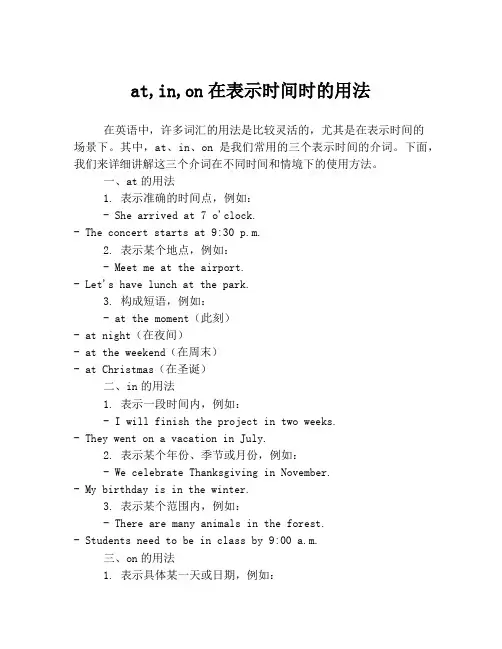
at,in,on在表示时间时的用法在英语中,许多词汇的用法是比较灵活的,尤其是在表示时间的场景下。
其中,at、in、on是我们常用的三个表示时间的介词。
下面,我们来详细讲解这三个介词在不同时间和情境下的使用方法。
一、at的用法1. 表示准确的时间点,例如:- She arrived at 7 o'clock.- The concert starts at 9:30 p.m.2. 表示某个地点,例如:- Meet me at the airport.- Let's have lunch at the park.3. 构成短语,例如:- at the moment(此刻)- at night(在夜间)- at the weekend(在周末)- at Christmas(在圣诞)二、in的用法1. 表示一段时间内,例如:- I will finish the project in two weeks.- They went on a vacation in July.2. 表示某个年份、季节或月份,例如:- We celebrate Thanksgiving in November.- My birthday is in the winter.3. 表示某个范围内,例如:- There are many animals in the forest.- Students need to be in class by 9:00 a.m.三、on的用法1. 表示具体某一天或日期,例如:- I have a doctor's appointment on Monday.- Our anniversary is on December 12th.2. 表示某个特定时间或节日,例如:- On Sunday morning, we always go to church.- We celebrate Halloween on October 31st.3. 表示周几,例如:- She has piano lessons on Tuesday.- We have a meeting on Friday afternoon.除此之外,还有一些特殊情况,需要用到at、in、on相应的结构,例如:- at night(在夜间),in the morning(在早上),on the afternoon(在下午)- at the same time(同时),in the meantime(与此同时),on time(准时)总之,at、in、on在表示时间的用法要视具体情境而定,需要根据上下文来了解其具体意义和用法。
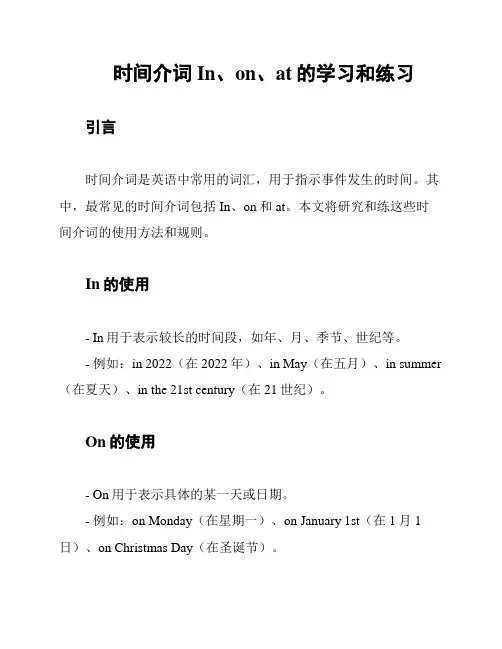
时间介词In、on、at的学习和练习引言时间介词是英语中常用的词汇,用于指示事件发生的时间。
其中,最常见的时间介词包括In、on和at。
本文将研究和练这些时间介词的使用方法和规则。
In的使用- In用于表示较长的时间段,如年、月、季节、世纪等。
- 例如:in 2022(在2022年)、in May(在五月)、in summer (在夏天)、in the 21st century(在21世纪)。
On的使用- On用于表示具体的某一天或日期。
- 例如:on Monday(在星期一)、on January 1st(在1月1日)、on Christmas Day(在圣诞节)。
At的使用- At用于表示具体的某个时间点或时间段。
- 例如:at 3 o'clock(在3点钟)、at noon(在中午)、at night (在晚上)、at the weekend(在周末)。
练请根据下面的句子,选择合适的时间介词填空:1. I usually go to bed ___ 10 p.m.2. My birthday is ___ August 15th.3. The concert will start ___ 8 o'clock in the evening.4. We always have a family gathering ___ Christmas Day.5. She was born ___ 1990.答案:1. at2. on3. at4. on5. in结论通过研究时间介词In、on和at的使用规则,并进行相应的练,我们可以更准确地表达时间概念。
掌握这些基本的时间介词用法,对于提高英语表达能力是非常重要的。
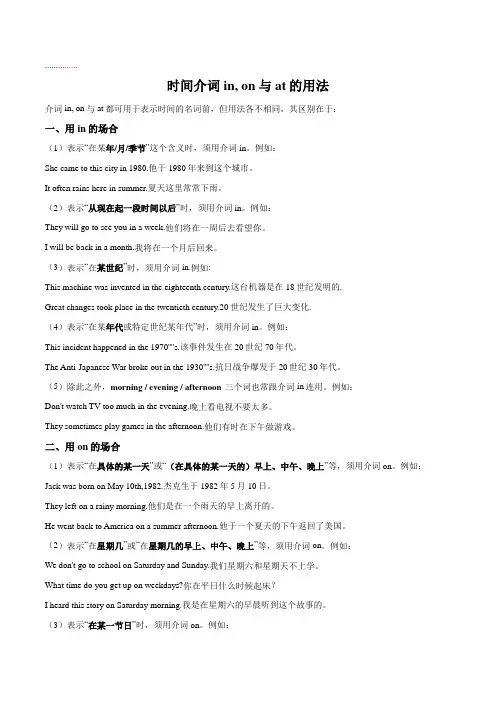
...............时间介词in, on与at的用法介词in, on与at都可用于表示时间的名词前,但用法各不相同,其区别在于:一、用in的场合(1)表示“在某年/月/季节”这个含义时,须用介词in。
例如:She came to this city in 1980.他于1980年来到这个城市。
It often rains here in summer.夏天这里常常下雨。
(2)表示“从现在起一段时间以后”时,须用介词in。
例如:They will go to see you in a week.他们将在一周后去看望你。
I will be back in a month.我将在一个月后回来。
(3)表示“在某世纪”时,须用介词in.例如:This machine was invented in the eighteenth century.这台机器是在18世纪发明的.Great changes took place in the twentieth century.20世纪发生了巨大变化.(4)表示“在某年代或特定世纪某年代”时,须用介词in。
例如:This incident happened in the 1970''''s.该事件发生在20世纪70年代。
The Anti-Japanese War broke out in the 1930''''s.抗日战争爆发于20世纪30年代。
(5)除此之外,morning / evening / afternoon三个词也常跟介词in连用。
例如:Don't watch TV too much in the evening.晚上看电视不要太多。
They sometimes play games in the afternoon.他们有时在下午做游戏。
二、用on的场合(1)表示“在具体的某一天”或“(在具体的某一天的)早上、中午、晚上”等,须用介词on。
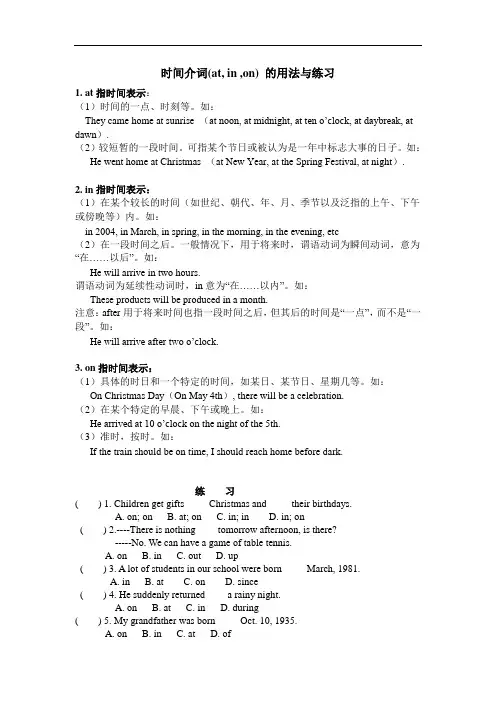
时间介词(at, in ,on) 的用法与练习1. at指时间表示:(1)时间的一点、时刻等。
如:They came home at sunrise (at noon, at midnight, at ten o’clock, at daybreak, at dawn).(2)较短暂的一段时间。
可指某个节日或被认为是一年中标志大事的日子。
如:He went home at Christmas (at New Year, at the Spring Festival, at night).2. in指时间表示:(1)在某个较长的时间(如世纪、朝代、年、月、季节以及泛指的上午、下午或傍晚等)内。
如:in 2004, in March, in spring, in the morning, in the evening, etc(2)在一段时间之后。
一般情况下,用于将来时,谓语动词为瞬间动词,意为“在……以后”。
如:He will arrive in two hours.谓语动词为延续性动词时,in意为“在……以内”。
如:These products will be produced in a month.注意:after用于将来时间也指一段时间之后,但其后的时间是“一点”,而不是“一段”。
如:He will arrive after two o’clock.3. on指时间表示:(1)具体的时日和一个特定的时间,如某日、某节日、星期几等。
如:On Christmas Day(On May 4th), there will be a celebration.(2)在某个特定的早晨、下午或晚上。
如:He arrived at 10 o’cloc k on the night of the 5th.(3)准时,按时。
如:If the train should be on time, I should reach home before dark.练习( ) 1. Children get gifts ____ Christmas and ____ their birthdays.A. on; onB. at; onC. in; inD. in; on( ) 2.----There is nothing ____tomorrow afternoon, is there?-----No. We can have a game of table tennis.A. onB. inC. outD. up( ) 3. A lot of students in our school were born ____ March, 1981.A. inB. atC. onD. since( ) 4. He suddenly returned____ a rainy night.A. onB. atC. inD. during( ) 5. My grandfather was born ____ Oct. 10, 1935.A. onB. inC. atD. of( ) 6. The train is starting ___ five minutes.A. inB. atC. forD. still( ) 7. Mike does his exercises ____ seven _____ the evening.A. on; toB. at; inC. by; ofD. at; on( ) 8. Children wake up very early ____ the morning of Christmas Day.A. inB. onC. forD. at( ) 9 ____ a cold winter morning, I met her in the street.A. InB. OnC. AtD. For( ) 10 It happened to be very cold____ the morning of our sports meeting.A. atB. onC. withD. of( ) 11. Why did you get up so early ___ this morning.A. onB. /C. atD. in( ) 12. He went to Shanghai___ September 3, 1991 and came back___ a cold morning last year.A. in; onB. on; inC. on; onD. in; in( ) 13. Lucy was born____ the night of May 12, 1984. . ...A. onB. inC. atD. to( ) 14. Mrs Brown came to China ____ 1996.A.onB. ofC. to,D. in( ) 15 ___ the morning of November 20, 1915, the workers came to Chicago to show their mourning of Joe Hill.A. OnB. InC. OnD. At( ) 16. Ann moved ___ Hangzhou ___ September, 1992.A. /; inB. to; inC. to; on D, in; in( ) 17. They started off ___ an autumn afternoon.A. duringB. atC. inD. on( ) 18. He often goes ____ school ____ six thirty ____ the morning.A. for; to; inB. to; at; inC. to; for; at D, for; at; to( ) 19. He arrived ___ Shanghai ___ 9: 30 ___ March 5.A. at; in; atB. to; on; atC. in; on; atD. in; at; on( ) 20.The English teacher told me to get there____ half past ten.A: in B. at C. on D. of答案:B A A A A A B B B B BC AD B A D B D B。
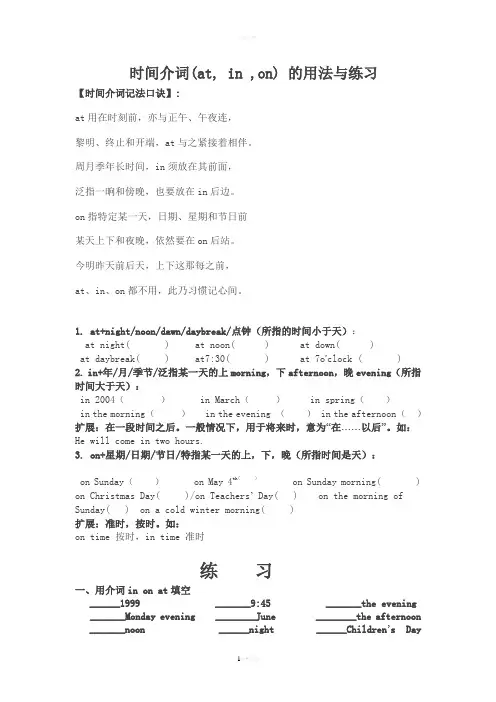
时间介词(at, in ,on) 的用法与练习【时间介词记法口诀】:at用在时刻前,亦与正午、午夜连,黎明、终止和开端,at与之紧接着相伴。
周月季年长时间,in须放在其前面,泛指一晌和傍晚,也要放在in后边。
on指特定某一天,日期、星期和节日前某天上下和夜晚,依然要在on后站。
今明昨天前后天,上下这那每之前,at、in、on都不用,此乃习惯记心间。
1. at+night/noon/dawn/daybreak/点钟(所指的时间小于天):at night( ) at noon( ) at down( )at daybreak( ) at7:30( ) at 7o’clock ( )2. in+年/月/季节/泛指某一天的上morning,下afternoon,晚evening(所指时间大于天):in 2004() in March() in spring()in the morning() in the evening () in the afternoon()扩展:在一段时间之后。
一般情况下,用于将来时,意为“在……以后”。
如:He will come in two hours.3. on+星期/日期/节日/特指某一天的上,下,晚(所指时间是天):on Sunday() on May 4th( ) on Sunday morning( ) on Christmas Day( )/on Teachers’ Day( ) on the morning of Sunday( ) on a cold winter morning( )扩展:准时,按时。
如:on time 按时,in time 准时练习一、用介词in on at填空______1999 _______9:45 _______the evening _______Monday evening ________June ________the afternoon _______noon ______night ______Children’s Day______Teachers’Day _______8 o’clock _______Summer_______May ______May,1999 ________May15th,1999 二、单选( ) 1. Children get gifts ____ Christmas(圣诞节) and ____ their birthdays.A. on; onB. at; onC. in; inD. in; on( ) 2.----There is nothing ____tomorrow afternoon, is there? -----No. We can have a game of table tennis.A. onB. inC. outD. up( ) 3. A lot of students in our school were born____March, 1981.A. inB. atC. onD. since( ) 4. He suddenly returned____ a rainy night.A. onB. atC. inD. during( ) 5. My grandfather was born____Oct. 10, 1935.A. onB. inC. atD. of( ) 6. The train is starting___five minutes.A. inB. atC. forD.still( ) 7. Mike does his exercises ____ seven _____ the evening.A. on; toB. at; inC. by; ofD. at; on( ) 8. Children wake up very early____the morning of Christmas Day.A. inB. onC. forD. at( ) 9 ____ a cold winter morning, I met her in the stfeet.A. InB. OnC. AtD. For( ) 10 It happened to be very cold____ the morning of our sports meeting.A. atB. onC. withD. of( ) 11. Why did you get up so early ___ this morning.A. onB. /C. atD. in( ) 12. He went to Shanghai___ September 3, 1991 and came back___ a cold morning last year.A. in; onB. on; inC. on; onD. in; ia( ) 13. Lucy was born____ the night of May 12, 1984. . ...A. onB. inC. atD. to( ) 14. Mrs Brown came to China ____ 1996.A.onB. ofC. to,D. in( ) 15 ___ the morning of November 20, 1915, the workers came to Chicago to show their mourning of Joe Hill.A. OnB. InC. OnD. At( ) 16. Ann moved___Hangzhou___September, 1992.A. /; inB. to; inC. to; on D, in; in( ) 17. They started off___an autumn afternoon.A. duringB. atC. inD. on( ) 18. He often goes ____ school ____ six thirty ____ the morning.A. for; to; inB. to; at; inC. to; for; at D, for; at;to( ) 19. He arrived ___ Shanghai ___ 9: 30 ___ March 5. A. at; in; at B. to; on; at C. in; on; at D. in; at; on( ) 20.The English teacher told me to get there____ half past ten.A: in B. at C. on D. of基数词与序数词专项练习一、知识归纳①基数词变序数词的规律:口诀:基变序,有规律,结尾加上th。
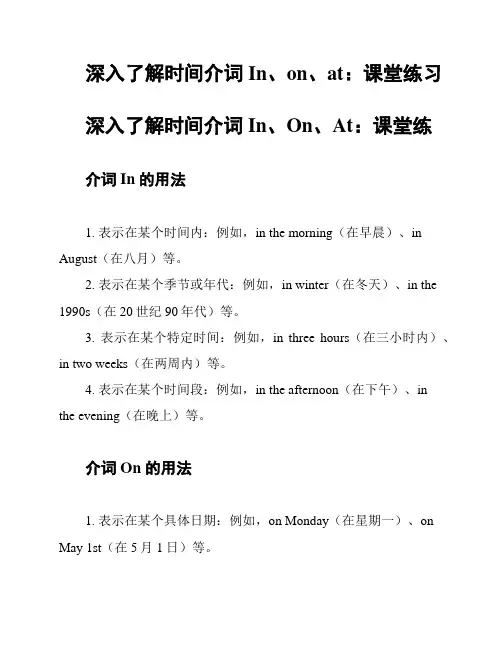
深入了解时间介词In、on、at:课堂练习深入了解时间介词 In、On、At:课堂练介词 In 的用法1. 表示在某个时间内:例如,in the morning(在早晨)、in August(在八月)等。
2. 表示在某个季节或年代:例如,in winter(在冬天)、in the 1990s(在20世纪90年代)等。
3. 表示在某个特定时间:例如,in three hours(在三小时内)、in two weeks(在两周内)等。
4. 表示在某个时间段:例如,in the afternoon(在下午)、inthe evening(在晚上)等。
介词 On 的用法1. 表示在某个具体日期:例如,on Monday(在星期一)、on May 1st(在5月1日)等。
2. 表示在某个特定时刻:例如,on time(准时)、on schedule (按计划)等。
3. 表示在某个特定日子:例如,on Christmas Day(在圣诞节)、on New Year's Eve(在除夕夜)等。
介词 At 的用法1. 表示在某个具体时刻:例如,at 8 o'clock(在8点钟)、at noon(在中午)等。
2. 表示在某个具体地点:例如,at the office(在办公室)、at the park(在公园)等。
3. 表示在某个特定活动中:例如,at a party(在派对上)、at a concert(在音乐会上)等。
请注意,以上只是介词 In、On、At 的一些常见用法,实际使用中还需根据具体语境进行判断。
同时,这些介词对应的时间概念在不同语言中可能存在差异,需要根据具体语言环境进行理解和使用。
参考资料:。
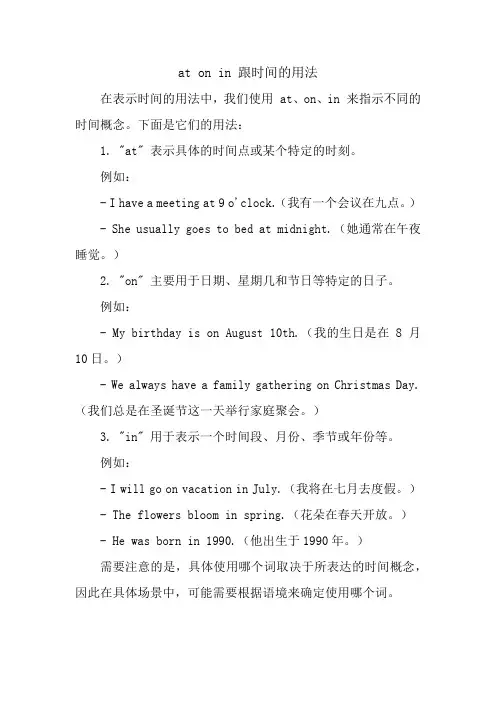
at on in 跟时间的用法
在表示时间的用法中,我们使用 at、on、in 来指示不同的时间概念。
下面是它们的用法:
1. "at" 表示具体的时间点或某个特定的时刻。
例如:
- I have a meeting at 9 o'clock.(我有一个会议在九点。
)- She usually goes to bed at midnight.(她通常在午夜睡觉。
)
2. "on" 主要用于日期、星期几和节日等特定的日子。
例如:
- My birthday is on August 10th.(我的生日是在8月10日。
)
- We always have a family gathering on Christmas Day.(我们总是在圣诞节这一天举行家庭聚会。
)
3. "in" 用于表示一个时间段、月份、季节或年份等。
例如:
- I will go on vacation in July.(我将在七月去度假。
)- The flowers bloom in spring.(花朵在春天开放。
)
- He was born in 1990.(他出生于1990年。
)
需要注意的是,具体使用哪个词取决于所表达的时间概念,因此在具体场景中,可能需要根据语境来确定使用哪个词。
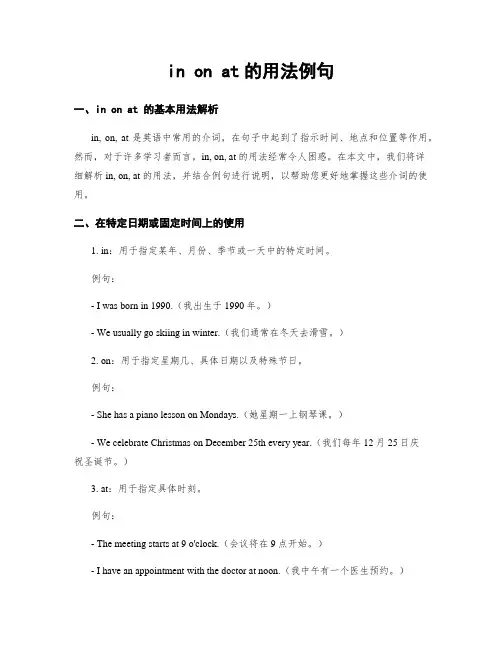
in on at的用法例句一、in on at 的基本用法解析in, on, at 是英语中常用的介词,在句子中起到了指示时间、地点和位置等作用。
然而,对于许多学习者而言,in, on, at 的用法经常令人困惑。
在本文中,我们将详细解析 in, on, at 的用法,并结合例句进行说明,以帮助您更好地掌握这些介词的使用。
二、在特定日期或固定时间上的使用1. in:用于指定某年、月份、季节或一天中的特定时间。
例句:- I was born in 1990.(我出生于1990年。
)- We usually go skiing in winter.(我们通常在冬天去滑雪。
)2. on:用于指定星期几、具体日期以及特殊节日。
例句:- She has a piano lesson on Mondays.(她星期一上钢琴课。
)- We celebrate Christmas on December 25th every year.(我们每年12月25日庆祝圣诞节。
)3. at:用于指定具体时刻。
例句:- The meeting starts at 9 o'clock.(会议将在9点开始。
)- I have an appointment with the doctor at noon.(我中午有一个医生预约。
)三、在地点或位置上的使用1. in:表示某个大区域或容器内部的位置。
例句:- The book is in the drawer.(书在抽屉里。
)- They live in New York City.(他们住在纽约市。
)2. on:表示某个水平面上的位置。
例句:- The cat is sitting on the table.(猫坐在桌子上。
)- There is a coat on the chair.(椅子上有一件外套。
)3. at:用于指定具体地点或建筑物。
例句:- Let's meet at the coffee shop downtown.(让我们在市中心那家咖啡店见面。
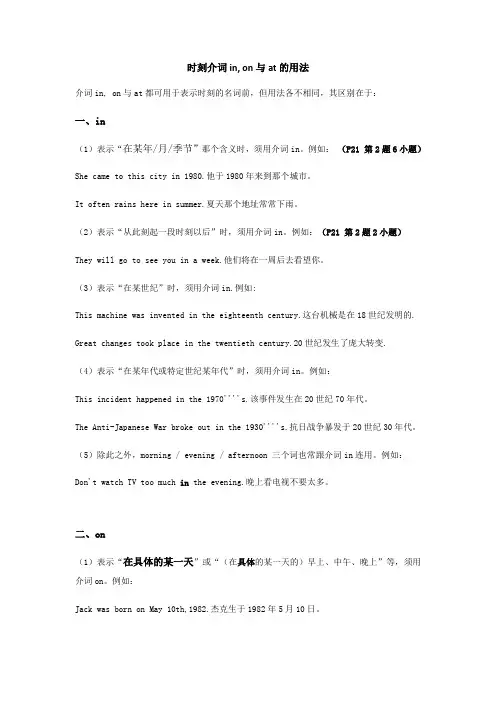
时刻介词in, on与at的用法介词in, on与at都可用于表示时刻的名词前,但用法各不相同,其区别在于:一、in(1)表示“在某年/月/季节”那个含义时,须用介词in。
例如:(P21 第2题6小题)She came to this city in 1980.他于1980年来到那个城市。
It often rains here in summer.夏天那个地址常常下雨。
(2)表示“从此刻起一段时刻以后”时,须用介词in。
例如:(P21 第2题2小题)They will go to see you in a week.他们将在一周后去看望你。
(3)表示“在某世纪”时,须用介词in.例如:This machine was invented in the eighteenth century.这台机械是在18世纪发明的. Great changes took place in the twentieth century.20世纪发生了庞大转变.(4)表示“在某年代或特定世纪某年代”时,须用介词in。
例如:This incident happened in the 1970''''s.该事件发生在20世纪70年代。
The Anti-Japanese War broke out in the 1930''''s.抗日战争暴发于20世纪30年代。
(5)除此之外,morning / evening / afternoon 三个词也常跟介词in连用。
例如:Don't watch TV too much in the evening.晚上看电视不要太多。
二、on(1)表示“在具体的某一天”或“(在具体的某一天的)早上、中午、晚上”等,须用介词on。
例如:Jack was born on May 10th,1982.杰克生于1982年5月10日。
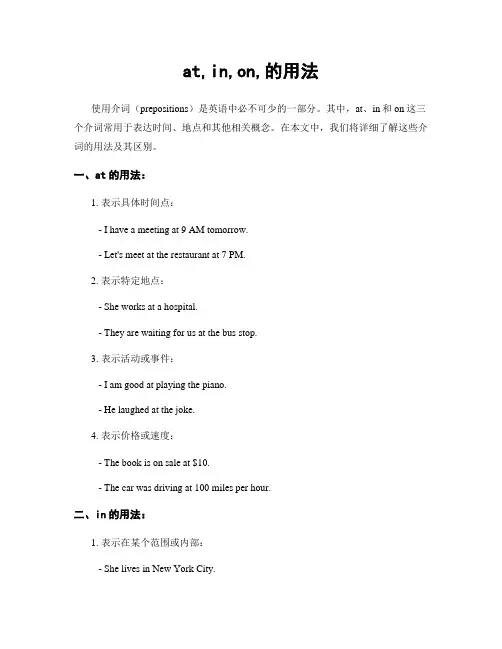
at,in,on,的用法使用介词(prepositions)是英语中必不可少的一部分。
其中,at、in和on这三个介词常用于表达时间、地点和其他相关概念。
在本文中,我们将详细了解这些介词的用法及其区别。
一、at的用法:1. 表示具体时间点:- I have a meeting at 9 AM tomorrow.- Let's meet at the restaurant at 7 PM.2. 表示特定地点:- She works at a hospital.- They are waiting for us at the bus stop.3. 表示活动或事件:- I am good at playing the piano.- He laughed at the joke.4. 表示价格或速度:- The book is on sale at $10.- The car was driving at 100 miles per hour.二、in的用法:1. 表示在某个范围或内部:- She lives in New York City.- We will be there in a few minutes.2. 表示季节、月份或年份:- I love hiking in spring.- My birthday is in October.3. 表示领域、行业或类别:- He works in finance.- She studies in the medical field.4. 表示状态或情况:- They are in love with each other.- He is currently in a meeting.三、on的用法:1. 表示具体日期和星期几:- The party is on Friday night.- I have an appointment with the doctor on June 10th.2. 表示在面向上方的表面或位置:- The book is on the table.- The picture hangs on the wall.3. 表示通过某种交通工具:- I travel to work on the bus.- She went to the party on her bike.4. 表示接触或处理某事:- I am working on my presentation.- He is focusing on his studies.综合比较这三个介词的用法可以得出以下总结:1. at用于表示具体时间点、特定地点、活动或事件以及价格或速度。
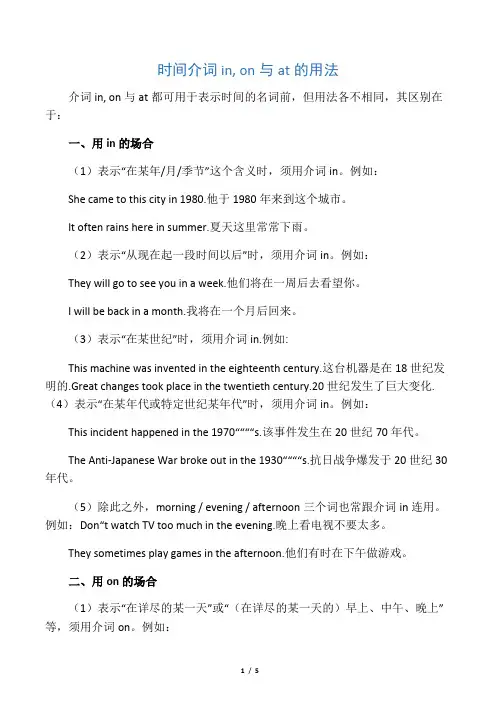
时间介词in, on与at的用法介词in, on与at都可用于表示时间的名词前,但用法各不相同,其区别在于:一、用in的场合(1)表示“在某年/月/季节”这个含义时,须用介词in。
例如:She came to this city in 1980.他于1980年来到这个城市。
It often rains here in summer.夏天这里常常下雨。
(2)表示“从现在起一段时间以后”时,须用介词in。
例如:They will go to see you in a week.他们将在一周后去看望你。
I will be back in a month.我将在一个月后回来。
(3)表示“在某世纪”时,须用介词in.例如:This machine was invented in the eighteenth century.这台机器是在18世纪发明的.Great changes took place in the twentieth century.20世纪发生了巨大变化.(4)表示“在某年代或特定世纪某年代”时,须用介词in。
例如:This incident happened in the 1970““““s.该事件发生在20世纪70年代。
The Anti-Japanese War broke out in the 1930““““s.抗日战争爆发于20世纪30年代。
(5)除此之外,morning / evening / afternoon三个词也常跟介词in连用。
例如:Don“t watch TV too much in the evening.晚上看电视不要太多。
They sometimes play games in the afternoon.他们有时在下午做游戏。
二、用on的场合(1)表示“在详尽的某一天”或“(在详尽的某一天的)早上、中午、晚上”等,须用介词on。
例如:Jack was born on May 10th,1982.杰克生于1982年5月10日。
时间介词 (at, in ,on)的用法与练习【介法口】 :at 用在刻前,亦与正午、午夜,黎明、止和开端, at 与之接着相伴。
周月季年, in 放在其前面,泛指一晌和傍晚,也要放在in 后。
on 指特定某一天,日期、星期和日前某天上下和夜晚,依然要在on 后站。
今明昨天前后天,上下那每之前,at、 in、on 都不用,此乃心。
1. at+night/noon/dawn/daybreak/ 点(所指的小于天):at night()at noon()at down()at daybreak()at7:30()at 7o’clock ()2.in+年 /月/季 /泛指某一天的上 morning ,下 afternoon ,晚 evening(所指大于天):in 2004()in March()in spring()in the morning()in the evening ()in the afternoon()展:在一段之后。
一般情况下,用于将来,意“在⋯⋯ 以后”。
如:He will come in two hours.3.on+星期 /日期 /日 /特指某一天的上,下,晚(所指是天):on Sunday()on May 4th()on Sunday morning() on Christmas Day()/on Teachers’Day()on the morning of Sunday( ) on a cold winter morning()展:准,按。
如:on time 按, in time 准练习一、用介 in on at 填空______1999_______9:45_______the evening _______Monday evening________June________the afternoon _______noon______night______Children ’s Day______Teachers’Day_______8 o’clock_______Summer_______May______May,1999________May15th,1999 二、单选() 1. Children get gifts ____ Christmas( 圣诞节 ) and ____ their birthdays.A. on; onB. at; onC. in; inD. in; on() 2.----There is nothing ____tomorrow afternoon, is there? -----No. We can have a game of table tennis.A. onB. inC. outD. up() 3. A lot of students in our school were born____March, 1981.A. inB. atC. onD. since() 4. He suddenly returned____ a rainy night.A. onB. atC. inD. during() 5. My grandfather was born____Oct. 10, 1935.A. onB. inC. atD. of() 6. The train is starting___five minutes.A. inB. atC. forD.still() 7. Mike does his exercises ____ seven _____ the evening.A. on; toB. at; inC. by; ofD. at; on() 8. Children wake up very early____the morning of Christmas Day.A. inB. onC. forD. at() 9 ____ a cold winter morning, I met her in the stfeet.A. InB. OnC. AtD. For() 10 It happened to be very cold____ the morning of our sports meeting.A. atB. onC. withD. of() 11. Why did you get up so early ___ this morning.A. onB. /C. atD. in() 12. He went to Shanghai___ September 3, 1991 and came back___ a cold morning last year.A. in; onB. on; inC. on; onD. in; ia() 13. Lucy was born____ the night of May 12, 1984. . ...A. onB. inC. atD. to() 14. Mrs Brown came to China ____ 1996.A.onB. ofC. to,D. in() 15 ___ the morning of November 20, 1915, the workers came to Chicago to show their mourning of Joe Hill.A. OnB. InC. OnD. At() 16. Ann moved___Hangzhou___September, 1992.A. /; inB. to; inC. to; on D, in; in() 17. They started off___an autumn afternoon.A. duringB. atC. inD. on() 18. He often goes ____ school ____ six thirty ____ the morning.A. for; to; inB. to; at; inC. to; for; at D, for; at; to() 19. He arrived ___ Shanghai ___ 9: 30 ___ March 5. A. at; in; at B. to; on; at C. in; on; at D. in; at; on() 20.The English teacher told me to get there____ half past ten.A: in B. at C. on D. of基数词与序数词专项练习一、知识归纳①基数词变序数词的规律:口诀:基变序,有规律,结尾加上th 。
at.in.on练习题附答案介词in, on与at都可用于表示时间的名词前,但用法各不相同,其区别在于:一、用in的场合表示“在某年/月/季节”这个含义时,须用介词in。
例如:She came to this city in 1980.他于1980年来到这个城市。
It often rains here in summer.夏天这里常常下雨。
表示“从现在起一段时间以后”时,须用介词in。
例如:They will go to see you in a week.他们将在一周后去看望你。
I will be back in a month.我将在一个月后回来。
表示“在某世纪”时,须用介词in.例如:This machine was invented in the eighteenth century.这台机器是在18世纪发明的. Great changes took place in the twentieth century.20世纪发生了巨大变化.表示“在某年代或特定世纪某年代”时,须用介词in。
例如:This incident happened in the 1970’’’’s.该事件发生在20世纪70年代。
The Anti-Japanese War broke out in the 1930’’’’s.抗日战争爆发于20世纪30年代。
除此之外,morning / evening / afternoon 三个词也常跟介词in连用。
例如:Don’t watch TV too much in the evening.晚上看电视不要太多。
They sometimes play games in the afternoon.他们有时在下午做游戏。
二、用on的场合表示“在具体的某一天”或“早上、中午、晚上”等,须用介词on。
例如:Jack was born on May 10th,1982.杰克生于1982年5月10日。
in,at和on的用法一、介词in、at和on的基本用法在英语中,介词是一个非常重要的语法成分,用于表示人或事物在空间、时间或情感等方面的位置关系。
其中,in、at和on是三个常见且容易混淆的介词。
本文将详细探讨它们的用法,并提供一些例句来帮助理解。
1. 介词in(在...内部)“in”表示某人或某物在一个相对较大范围、区域或封闭空间内部。
请看以下例子:a) I live in a house.(我住在一所房子里。
)b) The book is in the bag.(书在包里。
)可以注意到,“in”通常与指示特定地点或接触表面结构的名词连用。
2. 介词at(在...特定位置)“at”表示某人或某物占据了一个特定位置或场所。
请看以下例子:a) She's waiting at the bus stop. (她正在公交车站等待。
)b) Let's meet at the restaurant. (我们去餐厅见面吧。
)需要注意的是,“at”通常与具体地点或建筑物名称连用。
3. 介词on(位于表面之上)“on”表示某人或某物位于另一个物体的表面或某个地点之上。
请看以下例子:a) I put the cup on the table. (我把杯子放在桌子上。
)b) The cat is sitting on the chair. (猫坐在椅子上。
)可以注意到,“on”通常与接触表面或平面的物体连用。
二、in、at和on在时间表示中的用法除了表示空间位置外,in、at和on还可用于表示时间。
1. 介词in(在...期间)“in”用于表示某事发生或将要发生的某个时间段之内。
请看以下例子:a) I will see you in an hour.(一个小时后我会来见你。
)b) The concert is in December.(音乐会定于十二月举行。
)需要注意的是,“in”通常与较长的时间段连用,如小时、天、月份等。
In、on、at:时间介词的课堂练习解析本文将针对英语中的时间介词in、on、at进行课堂练解析。
这些介词在表达时间时有着不同的用法,正确的使用能够提升语言表达的准确性。
下面是一些例句,帮助我们理解它们的用法。
1. In- We will have a meeting in the afternoon.(我们将在下午开会。
)in the afternoon.(我们将在下午开会。
)- The concert will start in two hours.(音乐会将在两个小时后开始。
)in two hours.(音乐会将在两个小时后开始。
)- She was born in March.(她出生在三月份。
)in March.(她出生在三月份。
)介词"in"用于表达较长的时间段,如一天、一周、一年、一个世纪等。
它也可以用于月份、季节和年代。
2. On- I have an appointment with the doctor on Monday.(我周一有一个医生约会。
)on Monday.(我周一有一个医生约会。
)- The party is happening on Christmas Eve.(派对将在平安夜举行。
)on Christmas Eve.(派对将在平安夜举行。
)- Our anniversary is on May 12th.(我们的是在5月12日。
)on May 12th.(我们的纪念日是在5月12日。
)介词"on"通常用于特定的日期、天数、星期几或节日。
它表示在特定的时间点上。
3. At- She usually has breakfast at 7 o'clock.(她通常在早上七点吃早饭。
)at 7 o'clock.(她通常在早上七点吃早饭。
)- The movie starts at 8:30 PM.(电影将在晚上8点30分开始。
时间段介词In、on、at课堂练习介绍在英语中,时间段介词如in、on、at经常用于描述具体的时间。
然而,对于初学者来说,很容易混淆这些介词的用法。
本文档将通过一些课堂练来帮助大家熟悉和掌握这些介词的使用方法。
In的用法1. In用于表示较长的时间段,如年、季节、月份,以及一天中的某些时间段。
- I was born in 1990.(我出生在1990年。
)- We usually go skiing in winter.(我们通常在冬天去滑雪。
)- He wakes up early in the morning.(他早上早早醒来。
)2. In还可以表示一段时间如多少小时、分钟之后发生的事件。
- She will arrive in two hours.(她将在两小时后到达。
)- We'll meet again in five minutes.(我们将在五分钟后再见。
)On的用法1. On用于表示特定的某一天,包括星期几或具体的日期。
- I have a job interview on Monday.(我星期一有一个工作面试。
)- Our anniversary is on June 10th.(我们的是在6月10日。
)2. On还可以用于表示在特定的日子之间。
- He will be on vacation from July 20th to August 5th.(他将在7月20日至8月5日期间度假。
)At的用法1. At用于表示具体的时刻,如准确的时间点和钟点。
- I will meet you at 8 o'clock.(我将在8点钟见你。
)- The meeting starts at 9:30 am.(会议从上午9点30分开始。
)2. At还可以表示特定的节日或特殊的场合。
- We always have a big celebration at Christmas.(我们总是在圣诞节有一个盛大的庆祝活动。
时间介词(at, in ,on) 的用法与练习【时间介词记法口诀】:at用在时刻前,亦与正午、午夜连,黎明、终止和开端,at与之紧接着相伴。
周月季年长时间,in须放在其前面,泛指一晌和傍晚,也要放在in后边。
on指特定某一天,日期、星期和节日前某天上下和夜晚,依然要在on后站。
今明昨天前后天,上下这那每之前,at、in、on都不用,此乃习惯记心间。
1. at+night/noon/dawn/daybreak/点钟(所指的时间小于天):at night( ) at noon( ) at down( )at daybreak( ) at7:30( ) at 7o’clock ( )2. in+年/月/季节/泛指某一天的上morning,下afternoon,晚evening(所指时间大于天):in 2004()in March()in spring()in the morning()in the evening ()in the afternoon()扩展:在一段时间之后。
一般情况下,用于将来时,意为“在……以后”。
如:He will come in two hours.3. on+星期/日期/节日/特指某一天的上,下,晚(所指时间是天):on Sunday()on May 4th( )on Sundaymorning( ) on Christmas Day( )/on Teachers’ Day( )on the morning of Sunday( ) on a cold winter morning( )扩展:准时,按时。
如:on time 按时,in time 准时练习一、用介词in on at填空______1999 _______9:45 _______the evening _______Monday evening ________June ________the afternoon_______noon ______night ______Children’s Day ______Teachers’Day _______8 o’clock _______Summer_______May ______May,1999 ________May15th,1999 二、单选( ) 1. Children get gifts ____ Christmas(圣诞节) and ____ their birthdays.A. on; onB. at; onC. in; inD. in; on( ) 2.----There is nothing ____tomorrow afternoon, is there? -----No. We can have a game of table tennis.A. onB. inC. outD. up( ) 3. A lot of students in our school were born____March, 1981.A. inB. atC. onD. since( ) 4. He suddenly returned____ a rainy night.A. onB. atC. inD. during( ) 5. My grandfather was born____Oct. 10, 1935.A. onB. inC. atD. of( ) 6. The train is starting___five minutes.A. inB. atC. forD.still( ) 7. Mike does his exercises ____ seven _____ the evening.A. on; toB. at; inC. by; ofD. at; on( ) 8. Children wake up very early____the morning of Christmas Day.A. inB. onC. forD. at( ) 9 ____ a cold winter morning, I met her in the stfeet.A. InB. OnC. AtD. For( ) 10 It happened to be very cold____ the morning of our sports meeting.A. atB. onC. withD. of( ) 11. Why did you get up so early ___ this morning.A. onB. /C. atD. in( ) 12. He went to Shanghai___ September 3, 1991 and came back___ a cold morning last year.A. in; onB. on; inC. on; onD. in; ia( ) 13. Lucy was born____ the night of May 12, 1984. . ...A. onB. inC. atD. to( ) 14. Mrs Brown came to China ____ 1996.A.onB. ofC. to,D. in( ) 15 ___ the morning of November 20, 1915, the workers came to Chicago to show their mourning of Joe Hill.A. OnB. InC. OnD. At( ) 16. Ann moved___Hangzhou___September, 1992.A. /; inB. to; inC. to; on D, in; in( ) 17. They started off___an autumn afternoon.A. duringB. atC. inD. on( ) 18. He often goes ____ school ____ six thirty ____ the morning.A. for; to; inB. to; at; inC. to; for; at D, for; at; to ( ) 19. He arrived ___ Shanghai ___ 9: 30 ___ March 5. A. at; in; at B. to; on; at C. in; on; atD. in; at; on( ) 20.The English teacher told me to get there____ half past ten.A: in B. at C. on D. of基数词与序数词专项练习一、知识归纳①基数词变序数词的规律:口诀:基变序,有规律,结尾加上th。
一、二、三、特殊记,词尾字母t,d,d. (如:first, second, third)。
八减t,九去e,(如:eighth, ninth), f来把ve替。
(如:twelfth).单词ty作结尾,ty变成tie(如:twentieth).若是碰到几十几,只变个位就可以。
(如:twenty-first)②1-100的序数词:1st--first;2nd--second;3rd--third;4th--fourth;5th--fifth;6th--sixth;7th--seventh;8th--eighth;9th--ninth;10th--tenth;11th--eleventh;12th--twelfth;20th--twentieth;21st--twenty-first;22nd--twenty-second;29th--twenty-ninth;30th--thirtieth;31st--thirty-first;40th--fortieth;50th--fiftieth;60th--sixtieth;70th--seventieth;80th--eightieth;90th--ninetieth;100th--hundredth二、巩固练习:①写出下列词的序数词形式。
1. one2.two3. six4.five5.nine 6.twelve 7.eight 8.twenty-one②写出下列单词的基数词形式。
1.third2.fourth3.tenth4.twentieth5.nineteenth6.thirty-first _③根据句子意思填空。
1. Children’s Day(儿童节)is on the of June(六月).2. There are months(月)in a year(年).3. Teacher’s Day(教师节) is on the of September(九月).4. Three plus(加) six is .④选择填空。
( )1. My cousin’s birthday in on the of October.A. threeB. firstC. the second( )2. What date is it today? It’s of April.A. twelfthB. the 12thC. 12th( )3. There are days in a week.A. the sevenB. seventhC. the seventhD. seven( )4.Sunday is the day of a week.A. oneB. firstC. second( )5. Twenty-eight minus(减)six is .A. the twenty- secondB. twenty-twoC. twenty- second ( )6. Four plus(加) is twelve. A. seven B. eight C. nine。